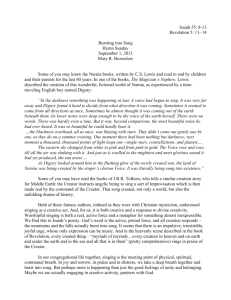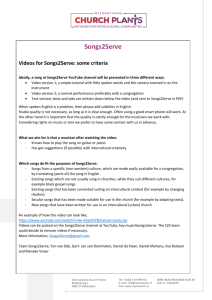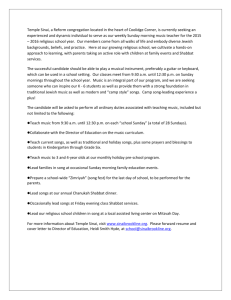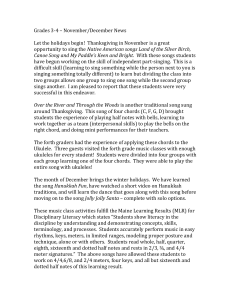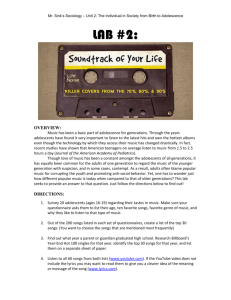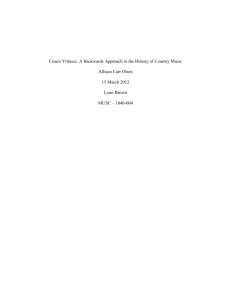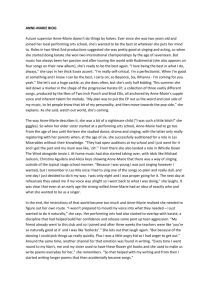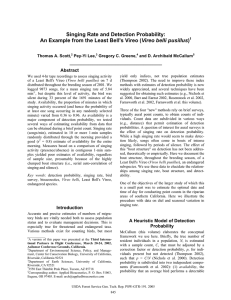MUSIC 331 * ELEMENTARY VOCAL METHODS
advertisement
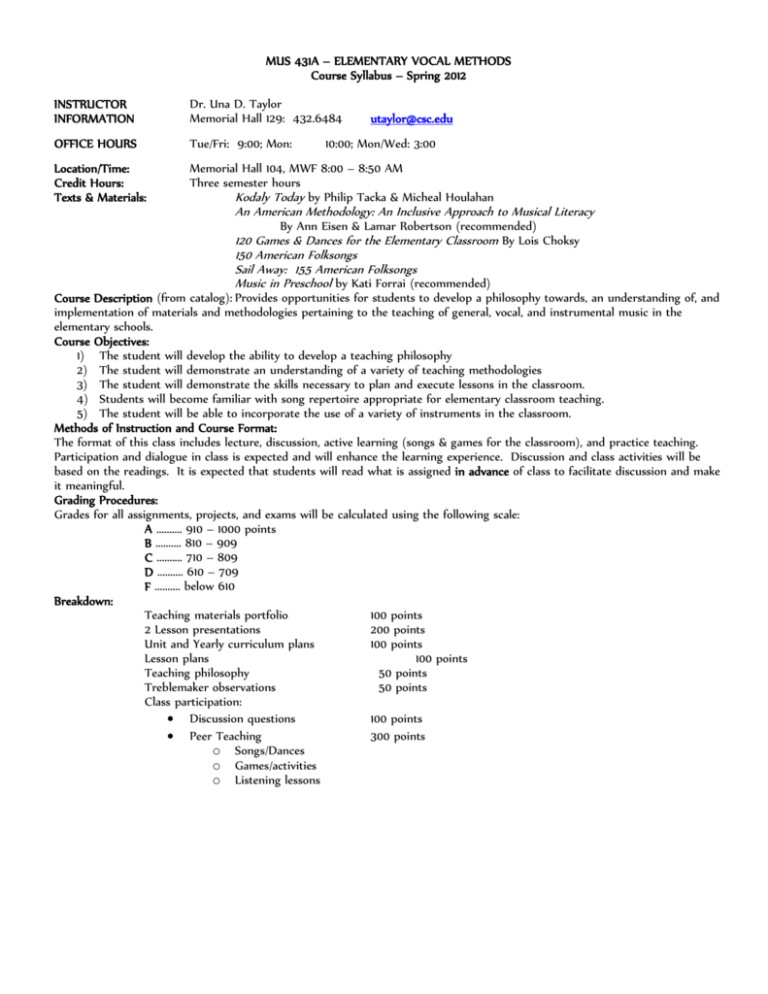
MUS 431A – ELEMENTARY VOCAL METHODS Course Syllabus – Spring 2012 INSTRUCTOR INFORMATION Dr. Una D. Taylor Memorial Hall 129: 432.6484 OFFICE HOURS Tue/Fri: 9:00; Mon: Location/Time: Credit Hours: Texts & Materials: Memorial Hall 104, MWF 8:00 – 8:50 AM Three semester hours Kodaly Today by Philip Tacka & Micheal Houlahan utaylor@csc.edu 10:00; Mon/Wed: 3:00 An American Methodology: An Inclusive Approach to Musical Literacy By Ann Eisen & Lamar Robertson (recommended) 120 Games & Dances for the Elementary Classroom By Lois Choksy 150 American Folksongs Sail Away: 155 American Folksongs Music in Preschool by Kati Forrai (recommended) Course Description (from catalog): Provides opportunities for students to develop a philosophy towards, an understanding of, and implementation of materials and methodologies pertaining to the teaching of general, vocal, and instrumental music in the elementary schools. Course Objectives: 1) The student will develop the ability to develop a teaching philosophy 2) The student will demonstrate an understanding of a variety of teaching methodologies 3) The student will demonstrate the skills necessary to plan and execute lessons in the classroom. 4) Students will become familiar with song repertoire appropriate for elementary classroom teaching. 5) The student will be able to incorporate the use of a variety of instruments in the classroom. Methods of Instruction and Course Format: The format of this class includes lecture, discussion, active learning (songs & games for the classroom), and practice teaching. Participation and dialogue in class is expected and will enhance the learning experience. Discussion and class activities will be based on the readings. It is expected that students will read what is assigned in advance of class to facilitate discussion and make it meaningful. Grading Procedures: Grades for all assignments, projects, and exams will be calculated using the following scale: A .......... 910 – 1000 points B .......... 810 – 909 C .......... 710 – 809 D .......... 610 – 709 F .......... below 610 Breakdown: Teaching materials portfolio 100 points 2 Lesson presentations 200 points Unit and Yearly curriculum plans 100 points Lesson plans 100 points Teaching philosophy 50 points Treblemaker observations 50 points Class participation: Discussion questions 100 points Peer Teaching 300 points o Songs/Dances o Games/activities o Listening lessons Make-up Policies: In the event that a student misses a scheduled presentation, an opportunity will be provided to make it up, however, the grade will be lowered one letter grade. Additionally, with each class meeting that the presentation is not made up, the student’s grade will be lowered by one letter grade. Exceptions to this policy will be made only in cases of a College-excused absence through the Dean’s office. Assignments are due at the beginning of class. Late assignments will not be accepted unless prior arrangements are made with the instructor. PLEASE MAINTAIN AN APPROPRIATE STANDARD OF PERFORMANCE BY COMING TO CLASS PREPARED; COME TO CLASS HAVING READ THE ASSIGNED MATERIAL AND HAVING DONE THE ASSIGNMENT. Thank you. Attendance Policy: This course involves active participation involving all class members. Attendance in class is essential. This course is part of your professional year. Unexcused absences are unprofessional. Each unexcused absence will result in a 50-point reduction of final grade. Three tardies equal one absence. COLLEGE POLICIES Student Behavior: Academic Honesty: Students are expected to conduct themselves in conformity with the highest standards with regard to academic honesty. Violation of college, state, or federal standards with regard to plagiarism, cheating, or falsification of official records will not be tolerated. Students violating such standards will be subject to discipline, as per campus policies articulated in the Student Handbook. Please request a copy of the Student Handbook from the Dean of Students (Crites Hall, 432-6280) Attendance Policy: The College assumes that students will seek to profit from the instructional program and will recognize the importance of attending every class meeting of courses for which credit is expected. Responsibility for notifying faculty of excused absences, and for arranging potential make-up, rests with the students. Civility: Civil behavior enhances the academic setting, and is expected at all times. The academic environment welcomes a difference of opinion, discourse, and debate within a civil environment. Plagiarism: Plagiarism will not be tolerated. Proof of plagiarism will result in an F for the semester. Nondiscrimination Policy/Equal Educational Opportunity Policy: Chadron State College is committed to an affirmative action program to encourage admission of minority and female students and to provide procedures that will assure equal treatment of all students. The College is committed to creating an environment for all students that is consistent with nondiscriminatory policy. To that end, it is the policy of Chadron State College to administer its academic employment programs and relate supporting services in a manner which does not discriminate on the bases of gender, race, color, national origin, age, religion, disability or marital status. Student requests for reasonable accommodation based upon documented disabilities should be presented within the first two weeks of the semester, or within two weeks of the diagnosis, to the disabilities Counselor (43206461; Crites 338) Disclaimer: This syllabus and schedule is articulated as an expectation of class topics, learning activities, and expected student learning. However, the instructor reserves the right to make changes in this schedule that, within my professional judgement, would result in enhanced or more effective learning on the part of the students. These modifications will not substantially change the intent or objectives of this course and will be done within the policies and procedures of Chadron State College. TENTATIVE COURSE SCHEDULE – MUS 431A (Subject to change) January 9 11 13 M W F Course Outline/Syllabus “Kodaly Today” ch. 1 & 2 Draft of Teaching Philosophy due 16 18 20 M W F Chap. 3 & 4 23 25 27 M W F Chap. 5 & 6 30 M NO CLASS (HIGH PLAINS FESTIVAL) 1 3 W F Chap. 7 6 8 10 M W F 13 15 17 M W F Chap. 9 & 10 20 22 24 M W F Chap. 11 27 29 2 M W F Practicing teaching songs and games MIDTERM BINDER REVIEW 5 7 9 M W F NO CLASSES MIDTERM BREAK 12 14 16 M W F 19 21 23 M W F 26 28 30 M W F 2 4 6 M W F Concept Plans due 9 M NO CLASS: SPRING BREAK February Chap. 8 March Lesson presentations begin! NO CLASS – HIGH PLAINS JAZZ FESTIVAL Concept Plans April Curriculum and Yearly Plans 11 13 W F 16 18 20 M W F 23 25 27 M W F 30 M 1 Exam Week Scholastic Day – No Class Resource materials Yearly Plans due REVISED TEACHING PHILOSOPHY DUE Teaching Phil. JURY DAY May TEACHING RESOURCE PORTFOLIO DUE Teaching Resource Portfolio The goal of this class is to provide you with practical experience, information, ideas, and materials to ready you for facing a roomful of students. The creation of this binder (or set of small binders, if you prefer) reflects this goal and is intended to serve as a comprehensive resource for you in the classroom. Therefore, the goal is to create a finished product, one that is neat, organized, and represents all your work this semester. It will contain the following: 1. 2. 3. 4. 5. 6. 7. Table of contents (comprehensive) Lesson plans (yours as well as those of your peers and any that I provide) Concept & Yearly plan templates Worksheets Teaching materials Song collection Resource lists a. Books (song sources) b. CDs c. Children’s books You will need: a. Binder(s): one LARGE (3 inch, maybe 4 inch) or three small b. Plastic cover sheets c. Tabs (to separate sections) Peer Teaching MUS 431A Spring 2012: Taylor Lesson plans must meet the following requirements: Lessons must be 20 minutes in length Please provide me with your lesson plan before you teach o Students are responsible for making and distributing copies to the class on the day they teach Be prepared with all materials ready to use Know and be able to sing your song material!! Know the game you are teaching Use the lesson format provided Submit your lesson plan one week prior to when you will be teaching it Lesson plans must include the following: A minimum of three songs in total One singing game (song w/ motions or games) One singing greeting Activities that address the three different aspects of learning: o physical, aural/oral, visual Use of a manipulative and/or instruments (for teacher or students) Use of icons, board, flash cards, etc. A worksheet that reflects the content of the lesson Some suggestions Practice teaching your lesson for a friend/classmate. Do not wait until the night before to plan your lesson…. Get together with others to sing songs to become more comfortable with singing. Check your lesson plans against lesson plans in the book for content and grade level learning objectives. Minimum Requirements for the submission of lesson plan assignments All assignments must be submitted electronically (by email) with the appropriate subject line as follows: Your name (last name first), course number, lesson plan grade level. All lesson plans must meet minimum requirements before they will be reviewed Second drafts may be submitted to improve grade. The first draft must be submitted along with the second draft in hard copy within one week of the original due date. Second drafts must also be submitted by email. RUBRIC FOR PEER TEACHING: Name ___________________________________ MUS 431A Date ________________________ Needs Improvement Well-done 1. Written lesson plan 2 4 Are the objectives for student learning clear and appropriate? Do the objectives match the grade level? Did the student follow the lesson plan? Is the lesson plan complete? Does the lesson plan address the national standards? Does the lesson plan include at least 5 musical skills? 8 10 12 15 2. Pitch & rhythm accuracy (songs) 3 5 10 In-tune singing/Rhythmic accuracy Memorization – does the student know the song well enough to teach it? Solfa singing 15 20 25 3. Selection of songs/activities 2 4 6 8 Appropriateness for grade level Does the song/activity selection facilitate the teaching of the objective(s) of the lesson? 10 15 4. Preparedness 2 Is the student ready with all necessary materials for teaching? Does the student know the songs and activities well enough to teach them? Did the student provide me and the class with a lesson plan? 4 6 8 5. Sequential process of lesson Do the steps follow logically? Do the transitions follow smoothly? Does the lesson include all required aspects of a music lesson? 2 4 6 8 10 6. Use of manipulative/instruments/Icons/Board Appropriateness and creativity Relevance to the teaching goals Was the use of icons and the board effective? 4 6 8 10 7. Overall strategy and Clarity of Instruction 2 4 6 Will the class understand what you are asking them to do? Do they know and understand the vocabulary? Was the design of the lesson a good strategy for teaching the chosen objective(s)? 8 10 8. Worksheet Appropriateness for grade level Creativity Does the worksheet address the objectives of the lesson? 4 5 2 6 Ok 1 2 3 10
